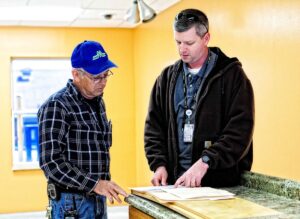HVAC system maintenance is a year-round preventative maintenance effort. We wanted to know a little more about what it takes to prepare a commercial HVAC system for the colder months, so we spoke with Darnell Walker, Business Development/Facilities Support Manager for The Ginn Group, to find out what type of maintenance goes into HVAC system preparation and why it’s important.
The process of preparing these systems for the winter months typically begins around Mid-September and October but could vary based on the weather. The time that it takes to complete the process also varies depending on whether there is a boiler system, heat pumps, hot water loops, chilled water loops, package units, or split systems.
The tasks involved in preparing the HVAC heating systems include things like:
- Inspecting the heating system thoroughly.
- Punching boiler tubes (cleaning each tube with a wire brush to ensure that they are clear of soot and debris).
- Cleaning and inspecting the firebox. The firebox houses important components such as:
- The burners
- The component that mixes air and natural gas to produce a flame.
- Ignitor assembly
- The metal piece that heats up to begin the ignition process.
- Manifold
- The part that helps to diagnose and repair the system.
- Gas valve
- Used to control the flow of gas within the system.
- The opening to the heat exchanger
- The component that transfers thermal energy from one medium to another, typically evaporator coils or condenser coils.
- The burners
- Flushing hot water lines.
- Checking hot water pumps for proper operation.
- Testing hot water loop chemicals and adding more if necessary.
If there is a cooling system, there are other types of maintenance, such as:
- Draining water lines to prevent freezing.
- Checking insulation for exposed pipe and reinsulating as needed.
- Changing air filters.
- Sealing off vent gaps.
- Checking thermostats and controls.
For systems like package units and split units that have a furnace, the added tasks involve:
- Checking the heat exchangers for cracks.
- Sealing off any gaps in the vents due to a louver being damaged.
- Clean all vents and exhausts.
That is a lot! It is all vital to protecting HVAC systems from freeze damage to pipes and coils, short-cycling of the compressors, maintaining the efficiency and effectiveness of the systems, and extending their life. All of these processes were developed as a result of lessons learned from previous incidents in the HVAC industry across a variety of systems.
Darnell told us that while none of these actions are necessarily difficult for him to perform, “punching the boiler and inspecting the firebox…can be very tedious and messy work.” He also included that performing year-round maintenance to your HVAC systems, “will ensure the least amount of downtime due to corrective maintenance because most of the system issues will be identified and repaired during the Preventive Maintenance Inspection process.”
At The Ginn Group Inc., we have over 25 years of experience in operating systems such as these. We would be glad to help with maintaining the efficiency of your HVAC systems.








